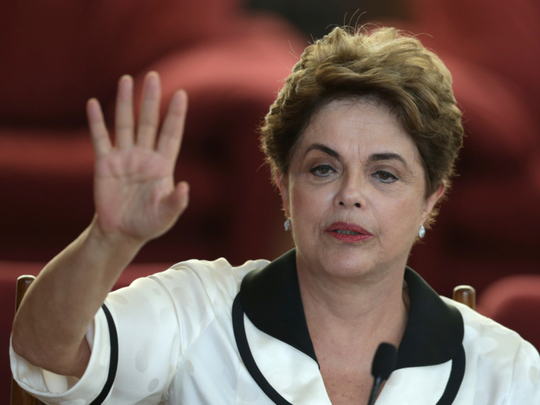
Brazil entered a new phase of turbulence last week with the impeachment of Dilma Rousseff by the Senate for manipulating budget figures, and the subsequent swearing in of new President Michel Temer.
Brazilian politics has always endured patches of rough weather, as the New York Times observed. “Brazil has had four elected presidents since democracy was restored in 1985. Two served out their terms. On Wednesday, Dilma Rousseff was the second to be ousted while in office amid political upheaval and allegations of wrongdoing ... Ms Rousseff’s departure marks the end of a transformative 13-year rule by the leftist Workers’ Party, which used state revenues generated by a commodities boom to lift millions out of poverty but lost support as the economy went into recession in recent years,” the paper said in an editorial.
Dispensing some stern advice for Temer to stabilise the nation, the paper added: “There are concrete steps the government can take to start restoring Brazilians’ faith in their scandal-plagued political elite. Michel Temer should allow the corruption investigations to continue and reject legislative initiatives meant to defang prosecutors. Until Brazilians can elect a new president in 2018, he could honour the country’s democratic process by remaining reasonably deferential toward the platform they last endorsed.”
The Washington Post termed Rousseff’s ouster a difficult but necessary step and said: “The spectacle in Brazil’s Senate chamber Wednesday was no demonstration of high-minded civics. Dozens of lawmakers who have been charged with personal corruption voted to remove President Dilma Rousseff, who in five years in office was never accused of self-enrichment. A bitter Ms Rousseff called it ‘an irony of history’. Her departure was nevertheless probably the best available outcome for a country reeling from political scandal and the worst recession in a century. It was legal; it was politically legitimate; and it opens the way for reforms that Brazil desperately needs.”
Examining in detail the reasons behind her departure, the paper said: “What really sunk the president was her disastrous mismanagement of the economy, which included not just overspending but also a dogmatic policy of restricting contracting by the state oil company to domestic firms — the trigger for the massive outbreak of graft. As the recession deepened, polls showed that Brazilians favoured Ms Rousseff’s ouster by a wide margin.”
Tracing what it called the “lamentable” recent turn of events, the Rio Times said: “As we moved forward, President Rousseff’s public approval ratings plummeted to 11 per cent. Then she gets caught on tape plotting to shield Lula from prosecution by hiring him as her Chief of Staff, which gets blocked. The Brazilian real falls to less than half its high point to the US dollar, and the economy slows to the lowest since 1990. A financial mismanagement/cooking-the-books accusation paves the way for Rousseff’s impeachment case ... Contrary to the modern definitions of tragedy and comedy, a professor once said that in storytelling, the ancient Greeks defined a Tragedy as a story where the hero does not change and is doomed to repeat their mistakes, and Comedy is a story where the hero does learn, and does change. We have yet to see where Brazil’s story will lead, but who can stop watching?”
The Guardian drew parallels between the growth of Brazil and the Rousseff scandal. “The impeachment of Dilma Rousseff is not just the story of one woman, who in her youth bravely fought dictatorship, rose to become president and has now been ushered from power amid an unprecedented countrywide corruption scandal. It is also the story of a nation: South America’s largest country, once applauded for its growing influence and its fight against poverty, now struggling with political tensions that have upended the 13-year rule of its Workers’ party. It is equally a tale of today’s shifting global landscape, in which powers that just years ago were celebrated as ‘emerging’ and likely to reshape the world find themselves confronted by difficulties rooted in economic downturns and flawed governance.”





_resources1_16a31069e4e_small.jpg)






